新概念英语第二册第20课课文讲解
(完整版)新概念英语第二册第20课课文讲解
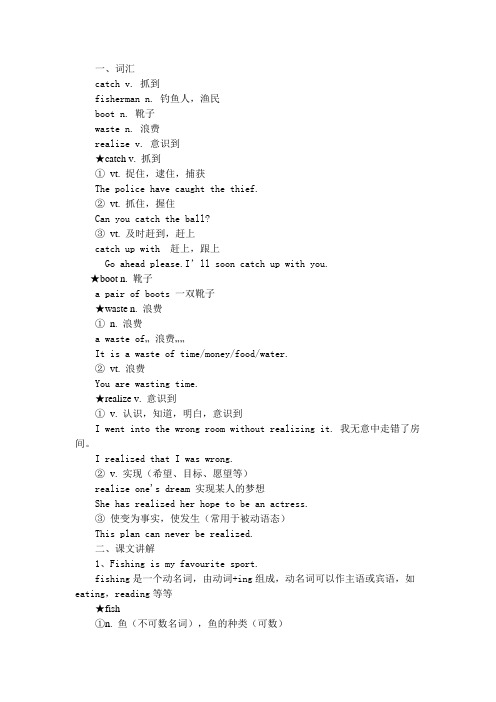
一、词汇catch v. 抓到fisherman n. 钓鱼人,渔民boot n. 靴子waste n. 浪费realize v. 意识到★catch v. 抓到①vt. 捉住,逮住,捕获The police have caught the thief.②vt. 抓住,握住Can you catch the ball?③vt. 及时赶到,赶上catch up with 赶上,跟上Go ahead please.I’ll soon catch up with you.★boot n. 靴子a pair of boots 一双靴子★waste n. 浪费①n. 浪费a waste of… 浪费……It is a waste of time/money/food/water.②vt. 浪费You are wasting time.★realize v. 意识到①v. 认识,知道,明白,意识到I went into the wrong room without realizing it. 我无意中走错了房间。
I realized that I was wrong.②v. 实现(希望、目标、愿望等)realize one's dream 实现某人的梦想She has realized her hope to be an actress.③使变为事实,使发生(常用于被动语态)This plan can never be realized.二、课文讲解1、Fishing is my favourite sport.fishing是一个动名词,由动词+ing组成,动名词可以作主语或宾语,如eating,reading等等★fish①n. 鱼(不可数名词),鱼的种类(可数)There are a lot of fishes(表示种类)in the sea.②v. 钓鱼, 捕鱼2、I often fish for hours without catching anything.for+时间表示一段时间for hours=for some hours 数小时without catching anything作为状语而出现, 表示结果状语。
新概念英语第二册:第20课课文详解及语法解析
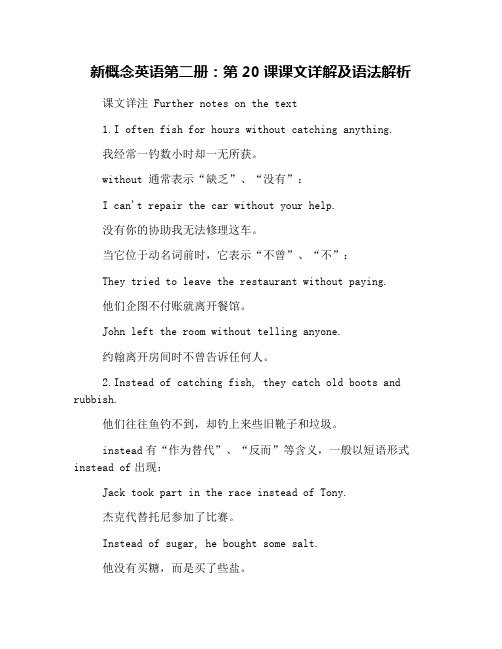
新概念英语第二册:第20课课文详解及语法解析课文详注 Further notes on the text1.I often fish for hours without catching anything.我经常一钓数小时却一无所获。
without 通常表示“缺乏”、“没有”:I can't repair the car without your help.没有你的协助我无法修理这车。
当它位于动名词前时,它表示“不曾”、“不”:They tried to leave the restaurant without paying.他们企图不付账就离开餐馆。
John left the room without telling anyone.约翰离开房间时不曾告诉任何人。
2.Instead of catching fish, they catch old boots and rubbish.他们往往鱼钓不到,却钓上来些旧靴子和垃圾。
instead有“作为替代”、“反而”等含义,一般以短语形式instead of出现:Jack took part in the race instead of Tony.杰克代替托尼参加了比赛。
Instead of sugar, he bought some salt.他没有买糖,而是买了些盐。
副词instead单独使用时一般出现在句尾:If you don't want a holiday in England, why don't you go to Australiainstead?如果你不想在英国度假,那你为什么不去澳大利亚呢?3.I am even less lucky.我的运气甚至还不及他们。
less是little的比较级,意为“不及”、“不如”、“更少”:Tom has got little chocolate, and Jack has got even less.汤姆只有一点儿巧克力,杰克则更少。
新概念英语第二册Lesson20

Lesson 20 One man in a boat【New words and expressions】生词和短语★catch v. 抓到 catch fish, catch thief catch cold:染上感冒 catch a bus:赶车catch one's breath:摒住呼吸 catch sight of(see):看见catch fire:着火 catch one's eyes:吸引某人注意力★fisherman n. 钓鱼人,渔民★boot n.靴子 a pair of boots★waste n. v. 浪费 You are wasting time.a waste of: It is a waste of time.★realize v. 意识到 I realized that I was wrong.实现,realize one's dream【课文讲解】fish一般情况下作为不可数名词用There are a lot of fishes(表示种类)in the sea.fish(v.):钓鱼,捕鱼主语通常由名词和代词充当,以及动词+ingfor+时间……表示一段时间 for hours=for some hourswithout (prep.) 介词后面一定要加宾语动词+ing:1.做主语;2.做宾语anything用在否定句中without作为状语而出现,表示结果状语, without 后面的动作是主语来做.He went out without saying any words.Without asking for money, the boy went to school.(v.)worry sb. The house worried me. My daughter worried me.(adj.)be worried about 主语为宾语而感到担心I was never worried about this.instead of 后面的词一定是没有做的,可以放在主句后面without强调没有做某件事,instead of强调这件事没做成而做成了另外一件事我原准备做……但是后来做了……I go to school instead of staying at home. I bought books instead of buying dresses. less+原级 (不如) : A is less ... than Bspend+时间+在某地:在某地度过……时间after(conj.)+从句,从句主语必须是主句的主语才能换成下面一种形式after(prep.)+名词/动词的ing形式After I go to school, I learned a lot of knowledge.After going to school, I learned a lot of knowledge.with: 带着 without;没带give up doing/stop doing:放弃做某事在船上in the boatnot at all在否定句中起强调作用【Key structures】动词+ing(非谓语动词)可以做主语和宾语b.be keen on, be fond of, be interested in, enjoy+动词ingbe afraid of, be up to ,be capable of, without, instead ofc. I apologize.apologize for (not) doing sth., thank you for..., congratulate sb. on doing sth. Exercises C1.without without prep.+ doingHe went out of the restaurant without paying the bill.2.instead ofShe bought a pair of boots instead of getting a pair of shoes.=She bought a pair of boots instead of a pair of shoes.3.of : She was afraid of spending the night alone.4.afterafter+从句;after prep.+doing After hearing the news, she fainted.5.beforeThink carefully before answering my question. 在回答我的问题之前,请仔细考虑。
新概念英语2册20课课件
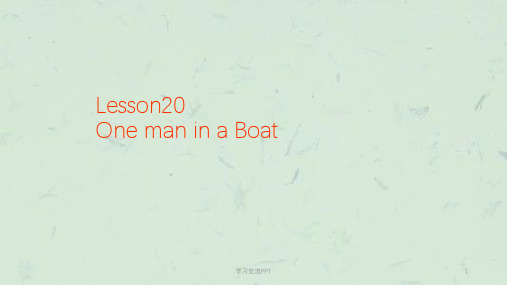
3
• catch • fisherman • boot • waste • realize
学习交流PPT
4
• 抓到 • 钓鱼人,渔民 • 靴子 • 浪费 • 意识到
学习交流PPT
5
【New words and expressions】 生词和短语
★catch v. 抓到 (caught;caught)
I like/enjoy/am fond of/am keen on fishing go fishing/swimming/shopping
fishing in troubled water 浑水摸鱼 fish for compliments 沽名钓誉
学习交流PPT
9
★boot n. 靴子
a pair of boots have one’s heart in one’s boots 极为悲观消沉 have one’s heart in one’s mouth 极为恐惧 boots 长筒靴 rubber boots 橡胶长靴 running shoes 跑鞋 tennis shoes 网球鞋 platform shoes 厚跟鞋 moccasin 软皮平底鞋 leather shoes 皮鞋 sandles 凉鞋 slipper 拖鞋 loafer 平底便鞋 sneakers 轻便运动鞋 (Am.)
学习交流PPT
10
★waste vt./n. 浪费
1) waste vt.浪费
You are wasting time.
Don’t waste your time,money and energy.
2)waste n. 浪费
a waste of 对…的浪费
It is a waste of time/money/feeling/food.
新概念英语第二册第二十课课后习题答案详解 Lesson 20教学内容

新概念英语第二册第二十课课后习题答案详解Lesson 201. b根据课文第4行 I never catch anything---not even old boots, 只有 b. nevercatches anything 与课文实际内容相同,而其他3个选择都与课文内容不符。
2.c根据课文最后一句I am only interested in sitting in a boat and doing nothingat all! 只有c. doing nothing 是正确答案,而其他3个选择都不符合课文内容。
3.b 本句是对主语提问的,回答是Fishing.a. who (谁)是对主语提问的;c. whom(谁)是对宾语提问的;d. whose(谁的)确是对定语提问的;只有b. which 是对做主语的事物提问的,所以选b.4.b本句是带never的否定句,只有b. anything 可以用在否定句中。
而a. nothing若用在否定句中,就会使原句变成肯定意义的句子,不符合题目意思;c. something 只能用于肯定句中;d. everything也不能用在否定句中。
5.c前面句子 I am even less lucky 中的 less(不及)是表示否定意义的比较级,只有c. not so是表示否定意义的,而其他3个选择都没有否定的意思.6.b只有b. an empty bag 最符合语法。
而其他3个选择都有语法错误。
a. a empty bag 中empty是以元音开头的,前面不能用a 而应该用an; c. empty bag 中 bag 是可数名词,需要用an 来修饰; d. oneempty bag 不符合习惯用法,单数可数名词前通常用不定冠词a 或an 修饰,除非表示强调才用one 修饰。
因此应该选b.7.c只有c. all 才能使这个句子同前一句I am only interested in doingnothing.的含义相符合,all等于the things that ,可以代替doing nothing. 而其他3个选择中a. only 和d. the only 不符合语法,b. the one 不符合题目意思,不能完全表达清楚。
新概念英语第二册lesson20
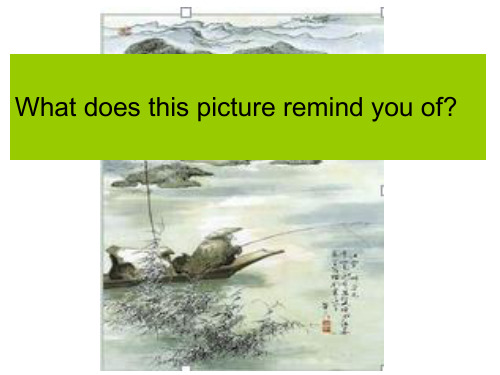
Listen and then answer the questions.
1.What is the writer’s favourite sport? 2.What do some unlucky fishermen catch? 3.Does he ever catch anything? 4.Is he really interested in fishing? 5.What is the only thing that interests him?
a.) Getting up early is a good habit. b.) Fishing is Tom’s favorite hobby. c.)Arguing with him is a waste of time.
Predicative
系动词又称连系动词,不 单独作谓语,必须与表语 连用构成系表结构。
What does this picture remind you of?
《江雪》的不同版本
River snow A hundred mountains and no bird,
A thousand paths without a footprint;
A little boat, a bamboo cloak, An old man fishing in the cold river-snow.
★fisherman n. 钓鱼人,渔民 fish→ fisherman (pl.fishermen) [注]不要忘了er 1)fish 鱼 单复数同形 They caught many fish that morning. 2)fishes 不同种类的鱼 3)fish v. 钓鱼 like enjoy I am fond of am keen on
(完整版)新概念英语第二册第20课课文讲解
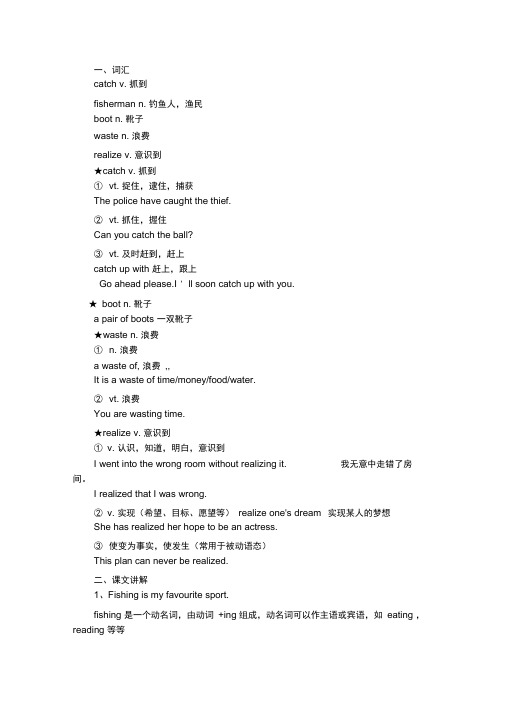
一、词汇catch v. 抓到fisherman n. 钓鱼人,渔民boot n. 靴子waste n. 浪费realize v. 意识到★catch v. 抓到①vt. 捉住,逮住,捕获The police have caught the thief.②vt. 抓住,握住Can you catch the ball?③vt. 及时赶到,赶上catch up with 赶上,跟上Go ahead please.I ' ll soon catch up with you.★ boot n. 靴子a pair of boots 一双靴子★waste n. 浪费①n. 浪费a waste of, 浪费,,It is a waste of time/money/food/water.②vt. 浪费You are wasting time.★realize v. 意识到① v. 认识,知道,明白,意识到I went into the wrong room without realizing it. 我无意中走错了房间。
I realized that I was wrong.② v. 实现(希望、目标、愿望等)realize one's dream 实现某人的梦想She has realized her hope to be an actress.③使变为事实,使发生(常用于被动语态)This plan can never be realized.二、课文讲解1、Fishing is my favourite sport.fishing 是一个动名词,由动词+ing 组成,动名词可以作主语或宾语,如eating ,reading 等等★fish①n.鱼(不可数名词),鱼的种类(可数)There are a lot of fishes(表示种类)in the sea.②V.钓鱼,捕鱼2、I often fish for hours without catching anything.for+ 时间表示一段时间for hours=for some hours 数小时without catching anything 作为状语而出现, 表示结果状语。
新概念英语第二册Lesson20课件
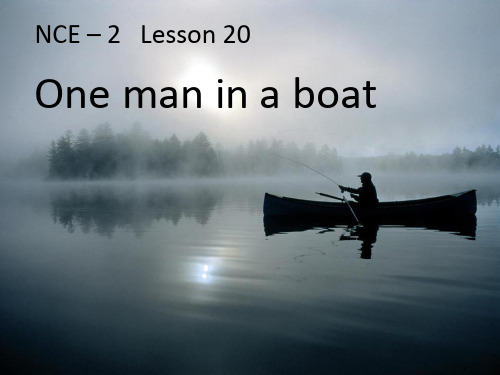
Notes on the text
You must give up fishing.
➢ give up doing… 放弃做… ➢ = stop ➢ She failed lots of times, but
动名词作宾语 He fell asleep without ……
动名词作宾语 - Practice
The thief took away the woman's wallet without ____. A) being seen B) seeing C) him seeing D) seeing him
➢I went into the wrong room without realizing it.
➢ 我无意中走错了房间。
➢ 我意识到我错了。
➢I realized that I was wrong.
realize: make ... come true
➢ 她实现了自己当一 名演员的梦想。
➢ She has realized her dream to be an actress.
动名词作宾语 without + doing
He is running in the rain
without ___ta_k__in_g___ his umbrella.
动名词作宾语
The actor is performing on the stage without _w_e_a_r_in_g_ his shoes.
A policeman caught a thief.
- 1、下载文档前请自行甄别文档内容的完整性,平台不提供额外的编辑、内容补充、找答案等附加服务。
- 2、"仅部分预览"的文档,不可在线预览部分如存在完整性等问题,可反馈申请退款(可完整预览的文档不适用该条件!)。
- 3、如文档侵犯您的权益,请联系客服反馈,我们会尽快为您处理(人工客服工作时间:9:00-18:30)。
一、词汇catch v. 抓到fisherman n. 钓鱼人,渔民boot n. 靴子waste n. 浪费realize v. 意识到★catch v. 抓到①vt. 捉住,逮住,捕获The police have caught the thief.②vt. 抓住,握住Can you catch the ball?③vt. 及时赶到,赶上catch up with 赶上,跟上Go ahead please.I’ll soon catch up with you.★boot n. 靴子a pair of boots 一双靴子★waste n. 浪费①n. 浪费a waste of… 浪费……It is a waste of time/money/food/water.②vt. 浪费You are wasting time.★realize v. 意识到①v. 认识,知道,明白,意识到I went into the wrong room without realizing it. 我无意中走错了房间。
I realized that I was wrong.②v. 实现(希望、目标、愿望等)realize one's dream 实现某人的梦想She has realized her hope to be an actress.③使变为事实,使发生(常用于被动语态)This plan can never be realized.二、课文讲解1、Fishing is my favourite sport.fishing是一个动名词,由动词+ing组成,动名词可以作主语或宾语,如eating,reading等等★fish①n. 鱼(不可数名词),鱼的种类(可数)There are a lot of fishes(表示种类)in the sea.②v. 钓鱼, 捕鱼2、I often fish for hours without catching anything.for+时间表示一段时间for hours=for some hours 数小时without catching anything作为状语而出现, 表示结果状语。
without 是介词,后面一定要加宾语, 动名词catching作 without 的宾语,without 后面的动作是主语来做的。
动名词也有动词的特性,可以有自己的宾语。
without 通常表示“缺乏、没有”;当它位于动名词前时,表示“不曾、不”I can’t repair the car without your help.They tried to leave the restaurant without paying.He went out without saying any words.3、But this does not worry me.★worryv. ①烦恼,担扰worry sb. 某人为……烦恼,担扰adj. 担心be worried about ……为……担心I was worried about my little daughter.4、Instead of catching fish, they catch old boots and rubbish.instead of… 我原准备做……但是后来做了……(instead of 后面的词一定是没有做的)I went to school instead of staying at home. 我没呆在家里而是去上学了I bought books instead of buying dresses.without强调没有做某件事, instead of强调这件事没做成而做成了另外一件事副词instead“作为替代,反而”,单独使用时一般出现在句尾If you don’t want a holiday in England, why don’t you go to Australia instead?5、I am even less lucky.less是little的比较级,意为“不及,不如,更少”I spend less time on English than on French.less+原形A is less…thanB A不如B6、After having spent whole mornings on the river, I always go home with an empty bag.spend+时间+在某地在某地度过……时间after <conj.>+从句在……之后after <prep.>+名词/动词的ing形式……之后(从句主语必须是主句的主语时两种形式可互换)After I go to school, I learned a lot of knowledge. (用一般式表示一个事实, 不用“went to” ) After going to school, I learned a lot of knowledge.介词after的宾语的动名词having spent所表示的动作发生在谓语动词go 之前,所以动名词用完成形式。
with an empty bag 注意连读with sth. 有……的,持有……的,随身带着……(状语)Who’s the man with the beard?without sth. 没带……I always go home without angthing. 什么都没带回家7、'You must give up fishing!' my friends say.give up doing sth. = stop doing sth. 放弃做某事Give up smoking.8、I'm not really interested in fishing.be intersted in sth. / doing sth. 对……感兴趣I’m interested in collecting stamps.三、语法动名词动词+ing 作名词时称为动名词,它仍有动词的属性,可以接宾语,动名词可以代替名词做主语和宾语或介词宾语。
1、动名词作主语Watching television is my favourite pastime. 看电视是我最喜爱的业余爱好.2、动名词作宾语Do you mind turning on the TV?Betty enjoys listening to pop music.3、利用介词/副词+动名词可以把两个句子连成一个句子apologize for (not) doing sth. 为什么事情而道歉I must apologize. I interrupted you. 我得表示道歉. 我打断了你的说话(工作).I must apologize for interrupting you.由于打断了你的说话(工作), 我得表示道歉. (for interrupting强调interrupt这个动词)I must apologize for having interrupted you.(for having interrupted 强调interrupt这个动词先发生,强调时间 (having done))以上两者为时间概念不同,意思相同congratulate (sb.) on doing sth. 因……祝贺(某人)He congratulated me. I won the competition. 他向我道贺. 我赢得了这次比赛.He congratulated me on winning the competition. 在我赢得这次比赛之际, 他向我祝贺.He congratulated me on having won the competition.thank you for listening/attending动名词用表示完成时的 having+过去分词结构往往强调动名词的动词发生在前面。
4、跟动名词的短语be keen on doing sth.(热忠于……),be fond of,be interested in,enjoy doing sth.(喜欢做某事), congratulations on doing sth. (祝贺……)be afraid of可以带动名词的介词有:before,after,without,instead of等I can’t watch TV without falling asleep. 我看电视时必定会睡着。
Exercises C(用括号中的词来连接下列句子, 如需要可对原句进行必要的改动)2.She bought a pair of boots. (instead of) She did not get a pair of shoes.She bought a pair of boots instead of getting a pair of shoes.=She bought a pair of boots instead of a pair of shoes.4.(After) She heard the news. She fainted.after+从句; after prep.+doingAfter hearing the news,she fainted. (faint vi.昏晕, 昏倒)四、特殊难点Interested and Interesting. Excited and Exciting.大多数现在分词和许多过去分词都可以作形容词用。
以-ed结尾的形容词常与人称主语连用,表示人的情绪、状态、喜好等;以-ing结尾的形容词则常与非人称主语连用,表明事物的某种特征、性质等。
Fishing is not interesting. I am not really interested in fishing.钓鱼没意思. 我对钓鱼并不真正感兴趣.The match was very exciting. The crowd got very excited.比赛非常激动人心. 观众非常激动.。
